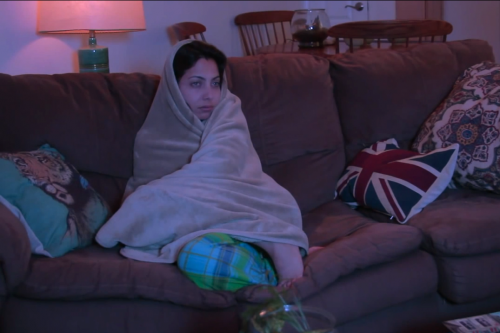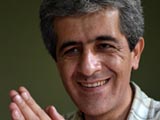Kathreen
by Yaghoub Yadali and translated by Parvaneh Torkamani / February 21, 2014 / 2 Comments
On prejudice: Does Iranian or Middle Eastern heritage mean ‘terrorist’?

Kathreen Khavari in 'Brain of Terror' a short film that analyzes the effects of racial profiling. Photo: ShabyVideos via YouTube.
Kathreen Khavari is an Iranian-American actress who has appeared in several American TV shows and is currently the star of the internet series Famous Farrah. She also recently played 11 different roles in the digital short “Brain of Terror” which was released on YouTube last month. In this film, as Khavari watches an episode of Homeland, she falls asleep and dreams of speaking with several other manifestations of her personality in a conference room. They believe they have helped the head of the terrorists in Homeland and are discussing whether or not their nightmare has made them terrorists.

- “Enemy…terrorism…nuclear bomb…war.” These words are often used by American media to describe Iran. The image the media presents is often hazy, incomplete, and distorted. The political and military aspects of my country are covered mainly in a negative light.
- In Under Eastern Eyes (I have adopted the name from the novel Under Western Eyes by Joseph Conrad), I will write about those topics which American media either cannot or does not want to talk about. The emphasis will be on social and cultural aspects of Iran although, out of necessity, I will talk about politics, despite my despair.

- Yaghoub Yadali, born in 1970, is a writer and television director. His first work of fiction, the short-story collection Sketches in the Garden, was published in 1997. It was followed in 2001 by Probability of Merriment and Mooning, which was named book of the year by the Writers and Critics Award. His first novel, The Rituals of Restlessness, won the 2004 Golshiri Foundation Award for the best novel of the year and was named as one of the ten best novels of the decade by the Press Critics Award. He has also published many articles and reviews of literature and cinema in newspapers and magazines in Iran.
One of them finds a questionnaire on the internet that helps to determine who is a terrorist. The first question is “Do they speak a language other than English?” One of the characters speaks Persian. Another question asks if they’ve ever eaten kabob. Another question asks if, when they get on and off of a plane, do they ever think the word Mohammad? One of them answers that once on a plane she watched a biopic about Mohammad Ali!
Based on that questionnaire they come to the conclusion that they could be terrorists.
The film’s main concern is the kind of identity that’s forced on people based on nationality and their parents’ place of birth.
The fact that someone speaks Persian, or has parents from Iran or the Middle East, or has the name Mohammad, can create a dangerous prejudice when it comes to issues such as terrorism. Kathreen Khavari’s problem is that most roles suggested to her depict her as terrorist, just because she’s Iranian and also knows Persian.
Similarly, I remember a time when I was about to fly from Dubai to Atlanta, Georgia. As soon as the official saw my Iranian passport, his voice became serious. He stared at me and asked several questions. One of them was: “How many suitcases have you delivered to the luggage carrier part of the plane?”
“Two!” I said.
He asked: “Do you have weapons or any similar things in your suitcase?”
I was really surprised at this question and didn’t understand what he meant by it. It was so strange to me that I asked him to repeat himself so I could make sure I heard correctly. He repeated the same question. At that moment I was both shocked and angry. I don’t know if it’s a normal question that they ask everyone or not, but I remember that, for a few people who got on the plane before me, such questions were neither asked, nor did their questioning take more than a few seconds. I told the official: “I am a writer who is invited to attend the International Writing Program at University of Iowa (IWP), and, other than a few books and clothes, there is nothing else in my suitcase.”
A little while ago I called an Iranian friend in Sweden and explained one of my short stories, which is about terrorism, to him. As I described one part of the story I used the words ‘bomb,’ ‘explosion,’ and the like. When this happened my friend gravely asked me not to use the word ‘bomb’ in our telephone conversation. He was worried that we might be overheard and the use of such words would create misunderstanding in American security agencies. In my opinion this was a ridiculous fear, but at the time, I respected my friend’s wish and changed the subject. Later I asked myself where this irrational fear and extreme worry comes from.
Many Iranians have stories and bitter memories, and often ridiculous experiences like mine that don’t relate to their person or their actions, but happen because of nationality, language, or their first and family name. It will be a long time before these prejudices and false images are corrected.





2 Comments on "Kathreen"
My partner and I stumbled over here by a different web address and thought I may as well check things out. I like what I see so now i’m following you. Look forward to looking into your web page again.
Thanks , I have recently been looking for information abput this subject for a long time and yours is
the best I’ve came upon so far. But, what concerning the conclusion? Are you certain in regards to the source?